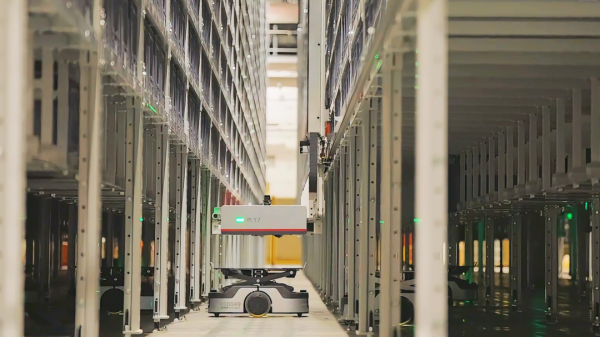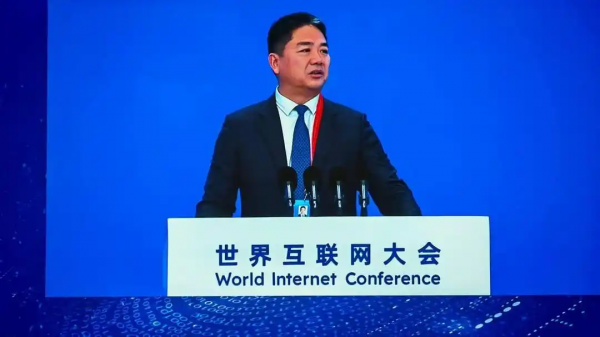Wang Zhenhui Makes a Comeback: Is JD Logistics Going All-in on Intelligent Transformation?
![]() 11/19 2025
11/19 2025
![]() 531
531
 Wang Zhenhui, the Current CEO of JD Logistics
Wang Zhenhui, the Current CEO of JD Logistics
JD Logistics Announces Another CEO Change
Recently, JD Logistics issued an announcement regarding Changes in Directors and Authorized Representatives:
The board of directors disclosed that due to other commitments within the JD Group, Mr. Hu Wei has tendered his resignation as an executive director, chief executive officer, and authorized representative in compliance with Rule 3.05 of the Rules Governing the Listing of Securities on The Stock Exchange of Hong Kong Limited, effective from November 13, 2025.
Concurrently, Mr. Wang Zhenhui has been appointed as an executive director, chief executive officer, and authorized representative of the company, with the appointment taking effect on November 13, 2025.
Over the past few years, JD Logistics has witnessed several leadership transitions. While these changes may seem like routine personnel adjustments, they actually serve as crucial indicators of the company's strategic shifts in rhythm and direction.
1. JD Logistics' Leadership Shift: A Strategic Move Towards Intelligence
The JD Group embarked on building its proprietary logistics network in 2007 and officially established JD Logistics Group in April 2017, with Wang Zhenhui appointed as its inaugural CEO. He stepped down from this role in December 2020.
During his tenure, Wang Zhenhui successfully spearheaded the socialized and open transformation of JD Logistics. He also oversaw the implementation of key projects such as "JD Precise Delivery" and "Unmanned Warehouse," steering JD Logistics towards becoming an intelligent supply chain platform.

Subsequently, Yu Rui assumed the CEO position until June 2023.
Notable milestones during his tenure included the inaugural flight and operations of JD Airlines, as well as the strategic integration of Deppon Logistics through merger and acquisition.
Later, Hu Wei took over as CEO of JD Logistics until this recent adjustment.
The industry has diverse opinions on this leadership transition.
Some argue that JD Logistics' post-IPO performance has not met market expectations, with its stock price declining by 18% over the past 250 trading days, directly reflecting the current capital market pressures it faces.
However, Hu Wei achieved commendable results during his tenure, not only driving steady growth in financial performance but also accelerating the company's global expansion.
From a broader perspective, this leadership adjustment appears to be a strategic move to identify a more suitable leader for JD Logistics' next strategic phase.
On November 7, Liu Qiangdong, the founder of JD Group, attended the opening ceremony of the "2025 World Internet Conference Wuzhen Summit" and delivered a keynote speech. He revealed that JD would establish the world's first fully unmanned delivery station in April of the following year.
This ambitious declaration underscores the profound transformation underway in the logistics industry.
Citing JD Logistics as an example, Liu noted that from a technological standpoint, logistics warehouses can already achieve 100% unmanned delivery.

Unmanned operations represent JD Logistics' future strategic direction, and the key to translating technological visions into strategic realities lies in having the right leadership.
It is reported that during his tenure as CEO of JD Logistics, Wang Zhenhui demonstrated a strong focus on cutting-edge technologies such as 5G, unmanned technology, and artificial intelligence, driving the implementation of relevant intelligent projects.
In recent years, JD Logistics' intelligent transformation has spanned various links, including trunk lines, warehousing, and delivery. On October 24, JD Logistics announced plans to purchase 3 million robots, 1 million unmanned vehicles, and 100,000 drones over the next five years, with the aim of fully deploying them across the entire logistics supply chain to further solidify its technological leadership in intelligent logistics.
Thus, Wang Zhenhui's return signifies a crucial step in deeply integrating JD Logistics' ambitious intelligence blueprint with the past experience of its core leader, aiming to inject certainty into the next phase of competition.
2. The New Era of Intelligent Logistics: No Company Can Stand Alone
Frequent CEO rotations generally indicate more than simple personnel changes; they serve the needs of internal strategic adjustments and transformational development.
The competitive landscape of the logistics industry has undergone a complete transformation. In the past, the focus was on warehousing networks, delivery speed, and cost control. Now, technology, particularly unmanned and intelligent technologies, has become the core variable shaping the future.
Rising labor costs in logistics represent one of the common challenges faced by logistics companies. Large-scale technological investments can convert variable labor costs into fixed assets with continuously improving efficiency, representing one of the paths to maintaining long-term competitive advantages.

Moreover, unmanned delivery goes beyond just "unmanned" operations and "low costs." It implies 24-hour service, ultimate precision (such as minute-level delivery), and the ability to handle complex scenarios (such as severe weather). This will be key to redefining "logistics service" standards and creating differentiated customer experiences.
For logistics companies, intelligence is not just a flashy concept; it brings tangible and quantifiable immense value to enterprises.
Thus, intelligence for logistics companies has long surpassed being a mere optional enhancement, becoming a core engine for reconstructing business models and an irreversible trend in the logistics industry.
Therefore, whether it is leading logistics companies like JD Logistics or others, no company can stand alone. The wave of intelligence is redrawing the starting line, bringing challenges and opportunities to every participant.
However, it cannot be denied that while intelligence is reshaping the industry, it also brings about the pain of structural transformation.
The most obvious impact is the employment shock, resulting in a structural contradiction where "there are people without jobs" and "there are jobs without people."
Numerous repetitive and process-oriented manual labor positions, such as sorters, porters, and last-mile delivery couriers, are gradually being replaced by intelligent devices. On the other hand, new positions like robot operation and maintenance engineers, drone pilots, and intelligent system dispatchers face talent shortages, rooted in the failure of labor skills to keep pace with technological advancements.

This requires enterprises and society to jointly establish new talent cultivation and transformation systems. For instance, leading companies like JD Logistics can assist existing employees in transitioning to new positions in technical operation and maintenance and system management through internal training and skill upgrading programs.
This transformation is not merely a technological upgrade but a reshaping of the entire industry value chain. Future logistics competition will be a comprehensive contest of technological ecosystems, talent structures, and organizational resilience.
Therefore, the value of humans has not disappeared but urgently requires upgrading and transformation amid challenges.
In this wave where no company can stand alone, the key to breaking through ultimately lies in "humans"—not only achieving the upgrading and transformation of employee skills but also requiring leaders capable of steering this complex transformation.
Wang Zhenhui's return also signifies the return of human leadership. At this critical juncture, with technological foresight and strategic execution, he leads JD Logistics through the pain of transformation, transforming the vision of unmanned operations into sustainable competitive advantages.
For logistics companies, there is no turning back from this transformation. Only by actively embracing it can they win the future in the new arena of intelligence.







